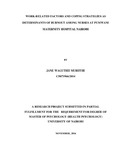| dc.description.abstract | The experience of burnout is brought about by continuous exposure to stressors and failure of coping strategies leading to exhaustion. Burnout has detrimental effects to the service provider both physically and psychologically. This study examined work-related factors and coping strategies as determinants of burnout among nurses working in Pumwani Maternity Hospital. Literature review was done on work-related factors, intervening variables and coping strategies in relation to burnout. A descriptive cross-sectional design was used. The study was conducted at Pumwani Maternity Hospital Nairobi. Study period was from August 2015 to December 2016.A total of 96 nurses were included in the study selected through Non-probability sampling. Clustering, Purposive and convenient sampling methods were used to select the sample. A self-administered data collection instrument consisting of socio-demographic data sheet, work related factors questions, Maslach Burnout Inventory -Human Services Survey and coping strategy indicator were used. Data acquired was processed using SPSS version 21, utilizing descriptive and inferential statistics. The theoretical frame work for the study is based on stress and coping by Lazarus and Folkman, (1984) and job demands and resources model Demerouti, Bakker, Nachreiner and Schaufeli (2001).Finding shows that Majority (88.6%) of the respondents were experiencing burn out. Age, gender, marital status, religion education level had a moderate relationship with burn out. Among the coping strategies, avoidance coping was found to be a significant predicator of burnout levels. As avoidance increases burnout increases among the respondents. Among the work related factors role conflict was found to be a significant predicator of burnout. When role conflict increases burnout increases. Extension of shift showed a negative relationship with burnout. Increase in extension of work shift (in hours) led to a decrease in the burnout levels. Work related factors were found to be more significant predictors of burnout than coping strategies. Results will be shared with relevant authorities (Pumwani, KNH-UON ERC, NACOSTI, and County health offices). The implication of the study shows need to implement strategies to reduce the incidence of burnout among nurses working in maternal health care facilities. These relate to increase in number of nurses, reduce workload, provision of resources, proper job description and work schedule, remuneration, training and compensation in hours for extended shifts | en_US |



